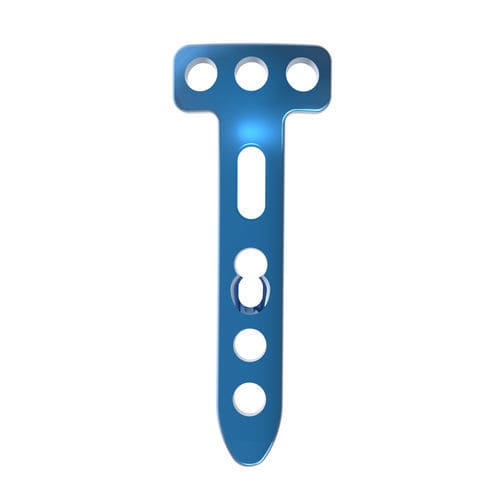
- Secondary care
- Orthopedic surgery
- Tibia osteotomy plate
- Truemed Medical

- Company
- Products
- Catalogs
- News & Trends
- Exhibitions
Tibia osteotomy plate TRUE LOCK Proximal Tibia High Osteotomyproximallockingmetallic
Add to favorites
Compare this product
Characteristics
- Applications
- tibia
- Part of bone
- proximal
- Locking
- locking
- Materials
- metallic
- Length
120 mm
(4.7 in)- Number of holes
4 unit
Description
TRUE LOCK Proximal Tibia High Osteotomy Anatomic Plates are indicated for osteotomies, treatment of bone and joint deformities, fixation of fractures, and malalignment caused by injury or disease, such as osteoarthritis, of the distal femur and proximal tibia.
Tibia plateau fractures make up 1-2% of all fractures and are in the third rank of adult fractures in terms of their incidence during 50 years of life. Plateau fractures involving the tibia upper end joint range widely from complex fractures caused by mild injuries.
It is generally seen after high-energy traumas in young people and low-energy traumas in osteoporotic bone in the elderly.
Proximal Tibia High Osteotomy Anatomic Locking Plate, It is designed to rearrange the stress distribution by changing the direction of the load axis passing through the diseased knee joint area, which is subjected to continuous loading, and to stabilize the fractures and deformities.
Two options wedge and wedge-free.
2 hole options between 4-6
TRUE Proximal Tibia High Osteotomy Anatomic Plates are made of Ti6Al4V ELI material (ASTM F136)
Catalogs
Truemed Catalog
96 Pages
Related Searches
- Bone plate
- Compression plate
- Metallic compression plate
- Locking compression plate
- Distal compression plate
- Compression bone screw
- Metallic compression bone screw
- Proximal compression plate
- Forearm compression plate
- Mid-shaft compression plate
- Arthrodesis nail
- Lateral compression plate
- General purpose compression bone screw
- Tibia compression plate
- Radius compression plate
- Humeral compression plate
- Metallic intramedullary nail
- Cannulated compression bone screw
- General purpose compression plate
- Femoral compression plate
*Prices are pre-tax. They exclude delivery charges and customs duties and do not include additional charges for installation or activation options. Prices are indicative only and may vary by country, with changes to the cost of raw materials and exchange rates.


